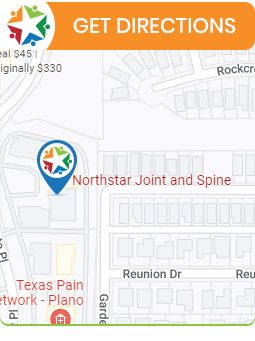Pain Management After Spine Surgery in Plano, TX
Recovering from spine surgery can be challenging, with pain management playing a key role in the healing process. At Northstar Joint and Spine, Board Certified Dr. Robert J. Nocerini, MD, offers specialized care to manage pain after spine surgery. By using targeted treatments and personalized strategies, our team helps patients minimize discomfort, speed up recovery, and restore mobility for a smoother post-surgical experience. For more information, contact us today or schedule an appointment online now! We are conveniently located at 7704 San Jacinto Pl Suite #200 Plano, TX 75024.




Table of Contents:
What can I expect after having back surgery?
How long does it take to recover from spine surgery?
How do pain management physicians help after spine surgery?
Why is pain management after back surgery so important?
Effective Pain Management After Spine Surgery with Dr. Robert J. Nocerini, MD, at Northstar Joint and Spine in Plano, TX
After undergoing back surgery, patients typically encounter a range of physical and emotional reactions as their bodies heal and adjust to the changes. The kind and scope of the procedure carried out determine the healing process. Here’s an overview of what to expect:
Post-surgery, patients usually feel discomfort or pain in the area of the operation. This will eventually lessen and is a typical aspect of the healing process. Physical therapy together with medication will be the first method to treat the pain. To minimize discomfort, it is imperative to adhere to the recommended dosage and schedule.
Swelling and inflammation may occur around the surgical area. Using cold packs and elevating the area can help reduce these symptoms. You may also be prescribed anti-inflammatory medication. Alongside this, proper wound care is crucial. The surgical incision will be closed with stitches or staples and needs to be kept clean to prevent infection and promote healing.
Follow-up appointments are a crucial component of recovery. Progress will be evaluated throughout these appointments, and any necessary modifications to the treatment plan will be made. Imaging tests, such as MRI or X-rays, may be ordered to evaluate healing. Reporting any unexpected symptoms is crucial as complications, while rare, can include infection, nerve damage, or blood clots.
After spine surgery, recovery takes many forms and differs widely from patient to patient because of a number of influencing factors, including the kind of surgery done, the patient’s age, overall health, and the existence of any underlying disorders.
The recovery process can be divided into several stages:
• Initial Recovery Period (First 2-6 Weeks): This phase involves healing the surgical wounds and gradually returning to normal daily activities. Comprehensive care is provided during this time; this includes managing patients’ pain, swelling, and discomfort through medication, physical therapy, and wound care.
• Progressive Rehabilitation (Weeks 6-12): As patients move beyond the initial recovery phase, they enter the long-term recovery period. This stage focuses on strengthening exercises and flexibility, with an increase in activity levels professional supervision. This phase is characterized by the healing of the affected spinal tissues and the strengthening of the muscles supporting the spine.
• Full Recovery (Months 3-6): By this stage, most patients experience significant pain relief and improved mobility. Nevertheless, the length of time may differ based on the intricacy of the procedure and the patient’s reaction to treatment and recuperation.
In some cases, full recovery may take up to two years. Recovery may be impacted by the type of operation, the patient’s condition, and other factors, compliance with rehabilitation, and effective pain management. Regular follow-ups are crucial and the importance of adherence to prescribed rehabilitation programs for a successful recovery is emphasized.
Every patient’s pain is unique, thus requiring a personalized approach to treatment. Thorough assessments are conducted to better understand the patient’s pain intensity, location, and nature better. Based on the findings, a tailored plan is devised encompassing various therapies, medications, and lifestyle modifications. This could include prescription pain relievers, anti-inflammatories, and nerve blocks to target specific pain pathways.
When precautionary measures are insufficient, you may be recommended invasive procedures. These include epidural steroid injections to reduce inflammation around the spinal cord and nerve roots. Facet joint injections and radiofrequency ablation can provide targeted pain relief by addressing specific joints or nerves. Additionally, this can also include a wide array of non-surgical procedures, such as nerve blocks and spinal cord stimulation, which can alleviate post-operative spine pain.
Patients are monitored closely, and treatment plans are adjusted as needed. Pain levels and medication dosages are regularly assessed and adjusted as treatment protocols to ensure optimal pain relief while minimizing side effects. At our practice, we also offer emotional support and education, understanding that chronic pain can lead to feelings of frustration, depression, and anxiety. By providing information about the recovery process and teaching coping strategies, we help patients manage not only their physical pain but also the emotional stress associated with it.
Effective pain management after spine surgery offers numerous benefits:
• Reduced pain and discomfort, improving quality of life
• Enhanced mobility and functionality
• Accelerated healing and recovery
• Improved sleep and overall well-being
By using a thorough strategy that incorporates customized treatment programs, invasive procedures, and multidisciplinary collaboration, we can help patients manage their post-operative pain and reclaim their quality of life after spine surgery. Pain management can help improve following things:
• Comfort and Quality of Life Improvement: Effective pain management promotes patient comfort and improves the overall quality of life post-surgery.
• Promoting Healing and Mobility: Promoting healing and mobility through effective pain control. This allows patients to move comfortably and engage in essential rehabilitation exercises, leading to better surgical results.
• Preventing Chronic Pain: Postoperative care is designed to prevent the development of chronic pain. Uncontrolled acute pain can lead to persistent pain conditions, significantly impacting a patient’s long-term quality of life.
• Reducing Hospital Stay and Healthcare Costs: Good pain management can reduce the length of hospital stay, lessening healthcare costs, and freeing up resources for other patients.
• Promoting Return to Normal Activities: By managing pain effectively after back surgery, patients can return to their normal activities and daily routines swiftly. This promotes a sense of normalcy and well-being.
• Improved Sleep: Adequate pain relief promotes restful sleep, which is crucial for the body’s repair and healing process.
• Ethical Considerations: Our commitment to ethical medical practice includes providing necessary pain relief to minimize patient discomfort and suffering post-surgery.
At Northstar Joint and Spine, we prioritize pain management after back surgery. We understand its importance in promoting healing and mobility, preventing chronic pain, reducing hospital stay, improving sleep, and facilitating a return to normal activities. Under the leadership of Dr. Nocerini, our team is dedicated to ensuring optimal surgical outcomes, reducing risks, enhancing patient satisfaction, and promoting a successful recovery.
Board-certified Dr. Robert J. Nocerini, MD, at Northstar Joint and Spine in Plano, TX, specializes in pain management for patients recovering from spine surgery. With his extensive experience, Dr. Nocerini creates personalized treatment plans to help reduce pain, improve mobility, and speed up recovery. His approach combines various methods, such as non-invasive therapies and targeted procedures, ensuring that each patient receives the most effective care tailored to their specific needs. Dr. Nocerini takes the time to understand each patient’s unique situation. His compassionate care ensures that patients feel supported throughout their recovery journey.
For more information, contact us today or schedule an appointment online now! We are conveniently located at 7704 San Jacinto Pl Suite #200 Plano, TX 75024. We serve patients from Plano TX, Willow Bend TX, Frisco TX, Allen TX, Addison TX, North Dallas TX, and surrounding areas.

Check Out Our 5 Star Reviews


Additional Services You May Need
▸ Back Pain
▸ Shoulder Pain
▸ Chronic Pain
▸ Epidural Steroid Injections
▸ Spinal Cord Stimulation
▸ Viscosupplementation
▸ Genicular Nerve Blocks
▸ Facet Injections
▸ Joint Injections
▸ Sacroiliac Joint Injections
▸ Lumbar and Cervical
▸ Facet Medial Branch Blocks
▸ Diagnostic Nerve Blocks
▸ Medication Management
▸ Neck Pain Doctor
▸ Diabetic Peripheral Neuropathy
▸ Headaches
▸ Suboxone
▸ Peripheral Nerve Stimulation
▸ Spine
▸ Joints
▸ Muscles
▸ Bones

Additional Services You May Need
▸ Back Pain
▸ Shoulder Pain
▸ Chronic Pain
▸ Epidural Steroid Injections
▸ Spinal Cord Stimulation
▸ Viscosupplementation
▸ Genicular Nerve Blocks
▸ Facet Injections
▸ Joint Injections
▸ Sacroiliac Joint Injections
▸ Lumbar and Cervical
▸ Facet Medial Branch Blocks
▸ Diagnostic Nerve Blocks
▸ Medication Management
▸ Neck Pain Doctor
▸ Diabetic Peripheral Neuropathy
▸ Headaches
▸ Suboxone
▸ Peripheral Nerve Stimulation
▸ Spine
▸ Joints
▸ Muscles
▸ Bones






